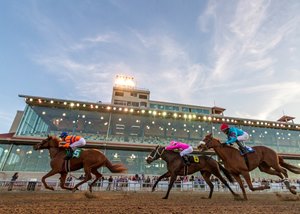Louisiana Commission Rescinds All Drug Policy Changes


The Louisiana Racing Commission took about seven minutes during an emergency meeting June 7 to rollback a series of more lenient medication withdrawal times and testing thresholds that had been adopted by emergency procedures in April and were scheduled to take affect June 8.
The medication policy changes had unleashed a firestorm of criticism that led first to a June 4 emergency meeting to specifically rescind the significantly less stringent withdrawal times for the bronchodilator clenbuterol and the joint injection anti-inflammatory methylprednisolone acetate (also known by its trade name Depo-Medrol). Horsemen told commissioners that the lower standards opened the door for more abuse of these drugs, so commissioners restored them to the previous standards.
Angst: Louisiana to Reduce Controlled Medication Restrictions
Still in place were withdrawal times and thresholds for multiple medications that were more forgiving than the standards set by the Association of Racing Commissioners International and promoted through its model rules. These lower standards prompted the Horseracing Integrity and Safety Authority to implement an emergency rule that would have put every horse shipped out of Louisiana to a HISA-regulated racetrack automatically onto the veterinarian's list on the grounds the horses were "medically compromised and unfit to race."
The new restriction on Louisiana horses running out of state elicited warnings from Churchill Downs Inc., which owns Fair Grounds Race Course and Slots, that this rule could hurt the Fair Grounds winter meet to such an extent that CDI might be forced to reduce race days, cut purses, and possibly cancel the track's Kentucky Derby (G1) prep races—the Lecomte Stakes (G3), Risen Star Stakes (G2), and the Louisiana Derby (G2).
Mitchell: Trainer: Vet's List Rule Could 'Destroy' Fair Grounds
LRC executive director Stephen Landry did express disappointment that much of the criticism heard this week about the rule changes did not surface earlier, but he said foremost "the commission does not want to create any undue hardships to Louisiana horse racing participants.
"Given these concerns, the commission has convened today to consider a total revision of the April 29 changes to the medication rules, thereby returning to the rules that had been in place for the last several years," he said. "The commission will continue to discuss optimizing these rules by participating with our veterinarians and other interested parties on the committee being convened by ARCI."
Ed Martin, president of ARCI, said in a June 5 letter that the association had been asked to review the LRC's proposed medication policy changes and that review will be handled by its Drug Testing Standards and Practices Committee, which is chaired by Dr. John Chancey.
"We will consider this in an open forum and other organizations, individuals, or regulatory entities like HISA afforded the opportunity to provide input," he noted.
With little discussion, nine LRC members voted unanimously to rescind all the emergency medication changes and return the state medication standards to the ones endorsed by the ARCI. Only commissioner Mike Halffrey offered a comment before the vote.
"We should have never considered these emergency drug rules, and I would like to apologize to all the horsemen in Louisiana and around the U.S. for the trouble this has caused," he said. "With that said, I would like to make a motion to rescind the emergency drug changes immediately and go back the ARCI drug rules effective today."
Following this vote, HISA announced it had dropped its emergency rule for Louisiana horses effective immediately.
"With the complete rescission of the Emergency Rule, the Horseracing Integrity and Safety Authority will not require Covered Horses shipping from Louisiana to a HISA jurisdiction to be placed on the HISA veterinarians' list as medically compromised and unfit to race as announced in the June 5 memorandum. HISA appreciates the commission's willingness to reconsider this important matter," read the HISA statement.
CDI also issued a statement in support of the LRC vote: "On behalf of our Fair Grounds team and our horsemen, we appreciate the decision today of the LSRC and believe it is in the best interest of Louisiana racing."
Trainer Keith Desormeaux, a Louisiana native who feared he would have to sell his Bayou State house and make plans to race in another state during the winter, expressed relief as well.
"I always hoped that cooler heads would prevail, but sometimes this stuff gets bogged down and people want to be stubborn," he said. "Maybe the commission was trying to show they cared about the horsemen, but they were ignorant about the real world of racing and what is going on in our industry. I'll sleep a lot better now."
